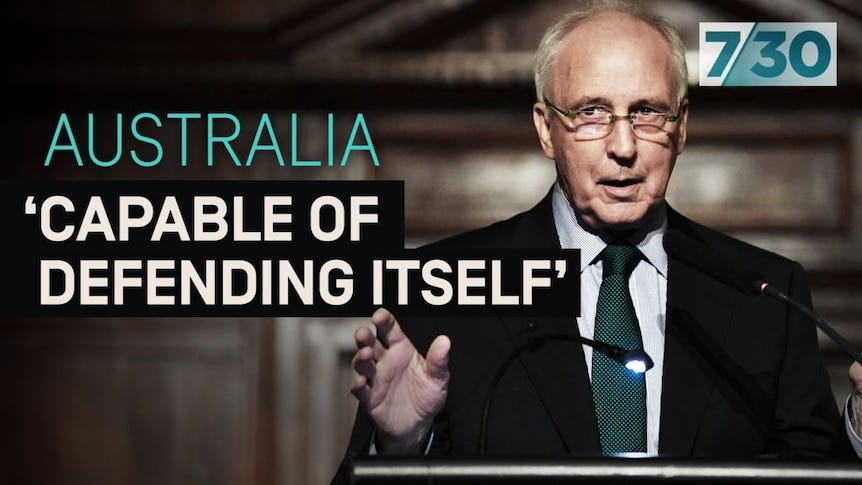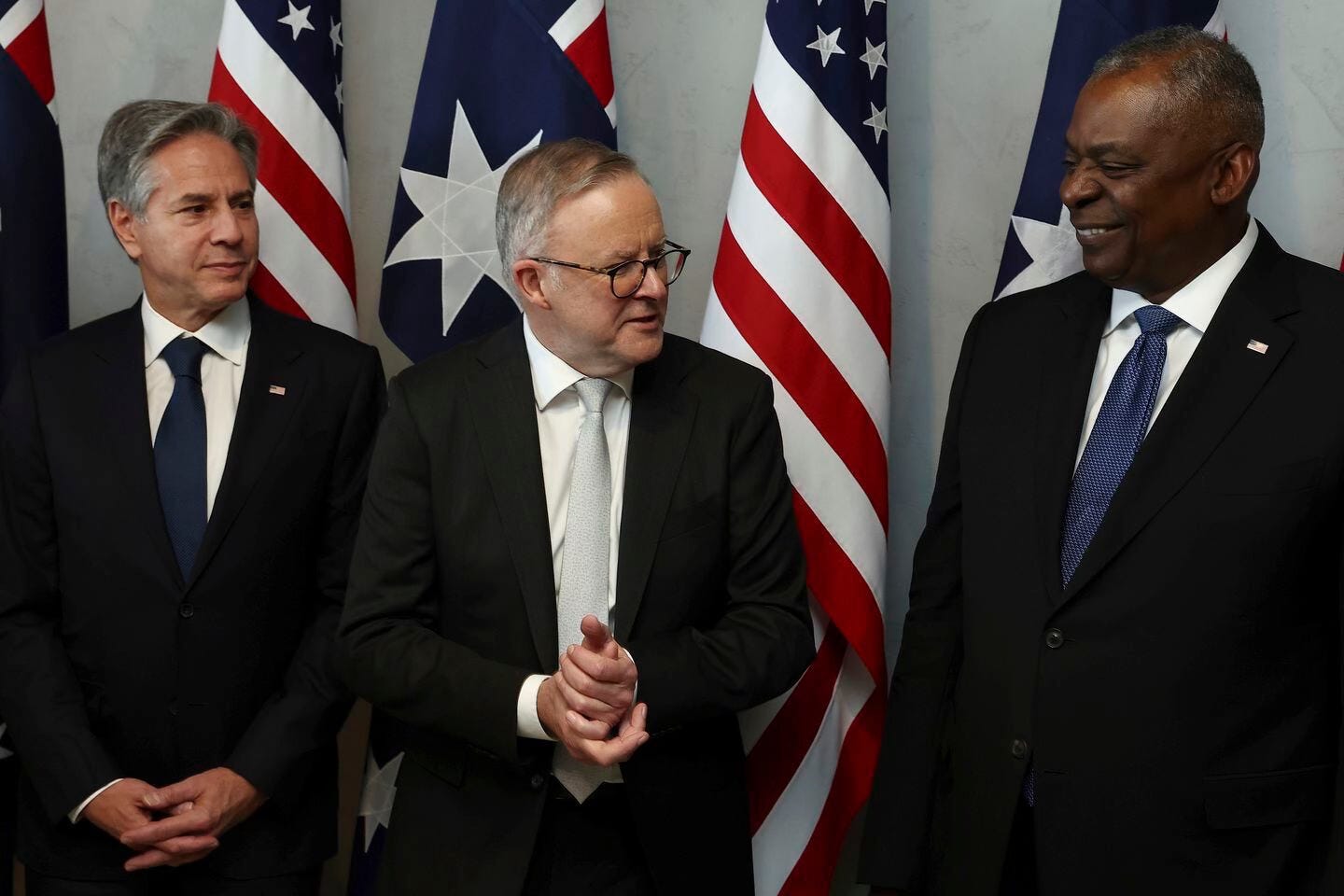Keating Counters United States
Desperate in our search for security from Asia we are becoming a US protectorate, Australia is still finding out what it doesn't know about its secretive AUKUS deal
Desperate in our search for security from Asia we are becoming a US protectorate
By Paul Keating
Aug 10, 2024
In responding to comments made by me overnight in respect of AUKUS and defence arrangements with the United States, the Prime Minister says ‘the world has changed between 1996 and 2024’. He says, ‘the world is different’.
These remarks are to imply that conditions which obtained during the period of my prime ministership are different to those which obtain today.
Of course, in a period of just on thirty years, international conditions do change. But the relevant issue is that our geography has not changed. And geography is the primary factor in geo-strategic settings.
The fact is, the Albanese government is returning to the Anglosphere to garner Australia’s security. In effect, the Albanese government is doing the very thing that all my life, I had trenchantly opposed, and in the post-War years, Labor had opposed. And that is, finding our security from Asia rather than our security in Asia.
We had tried our security from Asia with Britain in the first half of the twentieth century and that came crashing down in Singapore in 1942.
In defence and security terms, the Albanese government is dealing exclusively with Anglosphere states, principally the United States, and now, substantially with Britain and with a Britain that failed us in 1942, and which walked away from us in 1971 as part of its East of Suez policy.
Why any Australian government would return to Britain and rely on Britain for material defence resourcing could only be explained by the Morrison government’s ill-judged dealings with the Johnson government in Britain. And those dealings now form the basis of the Albanese government’s intention to build nuclear powered submarines in British shipyards.
The Albanese government’s principal Anglosphere partner is, of course, the United States. And reliance by the government on the United States is now taking the form, rather than simply building nuclear submarines, of facilitating expansive military base-building by the United States on Australian soil with ever-rising US troop movements through Australian bases.
<iframe width="560" height="315" src="
title="YouTube video player" frameborder="0" allow="accelerometer; autoplay; clipboard-write; encrypted-media; gyroscope; picture-in-picture; web-share" referrerpolicy="strict-origin-when-cross-origin" allowfullscreen></iframe>
The strength and scale of the United States’s basing in Australia will eclipse Australia’s own military capability such that Australia will be viewed in the United States as a continental extension of American power akin to that which it enjoys in Hawaii, Alaska and more limitedly in places like Guam.
Such an outcome is likely to turn the Australian government, in defence and security terms, into simply the national administrator of what would be broadly viewed in Asia as a US protectorate.
Instead of recognising and celebrating the rise of China, twenty per cent of humanity, from the abject poverty of its past, and dealing with it diplomatically, Australia under the Albanese government, is dealing with what Defence Minister Richard Marles today called ‘a threat to the rules-based order’. An order he implies is under imminent threat. That is, under threat from China.
All this means that the Albanese government is now searching for Australia’s security ‘from Asia’ if Asia is to include its largest and most populous state, China.
So when the Prime Minister says of me, that as prime minister, I was dealing with an Asia of a different kind thirty years ago, it was not so different then that any rational understanding if it now would force us back to such a defensive, compliant posture as is required of an Atlantic supplicant.
https://johnmenadue.com/desperate-in-its-search-for-security-from-asia-we-are-becoming-a-us-protectorate/
Analysis Australia is still finding out what it doesn't know about its secretive AUKUS deal
When US President Joe Biden announced he would not be standing for another term, Australia's political leaders expressed their gratitude for his contribution to public life. But this week, Australian voters had something else for which to be grateful to Biden.
For it was only as a result of a letter the US president wrote to the US Congress, that we found that there had been an update to the AUKUS agreement which will allow naval nuclear propulsion plants, rather than just nuclear propulsion "information", to be transferred to Australia.
But it is not this part of the letter that has raised eyebrows and hackles even if, as usual, we find out about such deals from the Americans before we find out about them from our own government. The formal part of the deal will be exposed when it is submitted to the Treaties committee of our own parliament.
It is a side agreement, between the US, the UK and Australia that is of considerable concern: a non-legally binding "understanding" that includes "additional related political commitments".
What are these? Well, they are secret.
The AUKUS saga moves on without much scrutiny
Critics argue that the "understanding" and "additional related political commitments" could include how and where these vessels are used. That is, what conflicts Australia would be expected to show up for, and how.
Some speculate on the possibility that it involves Australia agreeing to accept nuclear waste from the US and the UK, something the government has denied.
The idea that any of these such undertakings may have been made, but we aren't allowed to know, is simply outrageous.

A quick recap of the AUKUS deal reveals that we are still expecting to receive two second-hand US Virginia class submarines, before embarking on building an entirely new, and so far unseen, British submarine in Adelaide.
Of course, we get a bit of a say in the design and plans for that new sub, don't we?
Well the UK announced in October 2023 that it had selected BAE Systems for the SSN-AUKUS submarine. That month, Greens senator David Shoebridge asked officials about what involvement Australia had in the selection of the company that would build both the UK and Australian submarines.
The Australian Submarine Agency's Alexandra Kelton told the Senate that "we had, through our high commission, some notification that an announcement would be made and some context around that but not of the content in great detail".
The AUKUS submarine saga moves on with not much scrutiny in Australia, let alone apparently much input from Australia, given its cost and its huge strategic investment in one particular idea.
The second-hand Virginia class subs and later the AUKUS-class subs to be built in Adelaide are supposedly "sovereign Australian assets operating under the complete control of the Australian government".
The Greens' Shoebridge is one critic who warns the secret undertakings could include commitments on how the subs are used.
And this is a position which seems to be backed in by the authoritative papers written for the US Congressional Research Service.
In its latest update on the Virginia-class submarines, dated August 5, the Service's analysts once again outline the relative benefits costs and risks of an "alternative division-of-labor approach".
That's technical talk for an alternative plan in which "up to eight additional Virginia-class SSNs would be procured and retained in US Navy service and operated out of Australia along with the US and UK SSNs that are already planned to be operated out of Australia … while Australia invested in military capabilities (such as, for example, long-range anti-ship missiles, drones, loitering munitions, B-21 long-range bombers, or other long-range strike aircraft)".
That is, we don't get any submarines, the Americans (and Brits) just run theirs out of here. Along with an expansion of bomber visits, personnel and troop rotations.
The "deterrence and warfighting cost-effectiveness" arguments for doing this "include [the fact that] Australian Defence Minister Richard Marles in March 2023 reportedly confirmed that in exchange for the Virginia-class boats, Australia's government made no promises to the United States that Australia would support the United States in a future conflict over Taiwan."
"Selling three to five Virginia-class SSNs to Australia would thus convert those SSNs from boats that would be available for use in a US-China crisis or conflict into boats that might not be available for use in a US-China crisis or conflict. This could weaken rather than strengthen deterrence and warfighting capability in connection with a US-China crisis or conflict."
There's a lot more like that.

Riled on Friday by the prime minister's dismissal of his observations on AUKUS, Albanese's predecessor Paul Keating warned that "the strength and scale of the United States's basing in Australia will eclipse Australia's own military capability such that Australia will be viewed in the United States as a continental extension of American power akin to that which it enjoys in Hawaii, Alaska and more limitedly in places like Guam".
"Such an outcome is likely to turn the Australian government, in defence and security terms, into simply the national administrator of what would be broadly viewed in Asia as a US protectorate," he said.
If that happens, voters are likely to be the last to know about it.
Laura Tingle is 7.30's chief political correspondent.









